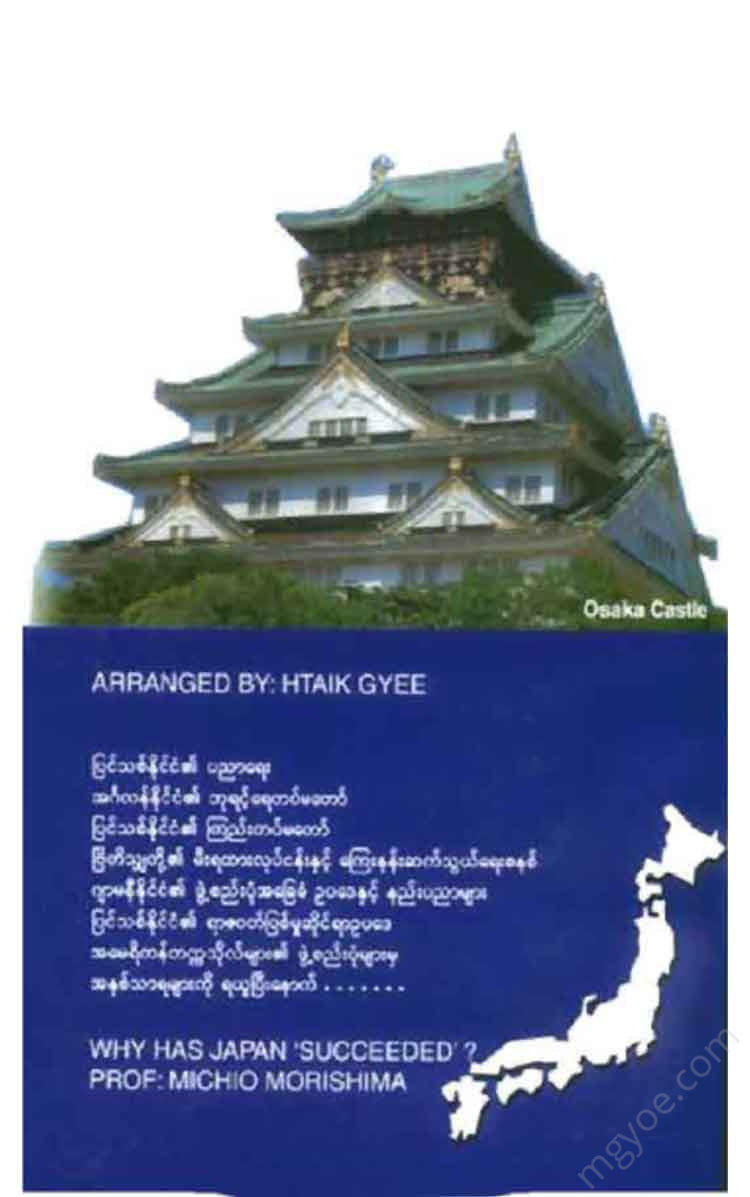Other Websites
Maung Tun Thu - Why was Japan successful?
Maung Tun Thu - Why was Japan successful?
Couldn't load pickup availability
:: Click on Buy it now to download the ebook . After placing your free order, the download link will be sent to the reader's email address used to log in to the mgyoe.com website.
:: The Ebook (Free) books on mgyoe.com are only books that have been circulating on the internet for a long time.
:: It is just a compilation so that readers can easily find it when they want to read it.
:: If reprinted by bookstores, the download links for these e-books will be removed.
------------------------------------
Introduction
Karl Marx argued that ideology and worldly morality are merely reflections of fundamental material conditions, especially economic conditions. He argued this with great force and with much evidence. Mac Weber also pointed out the contradiction between religion and system in his book "Protestant Ethic and the Spirit of Capitalism".
In his view, morality is a given by religion. If the characteristics of behavior that people acquire as a result of the needs of an economic system are not in harmony with morality, then morality is unlikely to develop. Morality and resources are seen as necessary for the existence of an economic system. Weber examined the major religions of the world from this perspective.
Here we need to take a closer look at Weber's conclusions about "CONFUCIANISM." Confucius (557-479 BC) was a great Chinese philosopher. He preached about the moral improvement of people. His main teachings were about respect for parents and ancestors, devotion to them, and the establishment and maintenance of justice and peace in society.
Weber said that Confucianism was similar to the 'Puritanism' of a group that believed that the old Christian doctrine that had been in existence in England for centuries should be purified. Confucianism was based on rationalism (reasoning based on reason). The Puritans also held to the same principles. However, there was a fundamental difference between the two. In particular, Puritan rationalism sought to rationalize and control the world. Confucian rationalism, on the other hand, saw the individual as the
It is said that one should strive to live in harmony with the world by adhering to rationalism. After outlining this fundamental difference, Weber says that those who believe in Confucianism tend to hold this kind of attitude.
Despite this conclusion, Weber openly compares his view that “the Chinese, although not more capable than the Japanese, have the ability and capacity to do things in their own way. They are also capable of developing capitalism, which combines science, technology, and economics, as is common in modern civilization.”
However, it must be admitted that the ideology adopted by the Japanese was also Confucianism. Here, Weber's attitude towards the Japanese was unclear. It is not known whether he considered Japan to be a Confucian country. Weber did not state this clearly in his book "CONFUCIANISM AND TAOISM". Furthermore, he did not state clearly that the "capitalism" adopted by Japan was in accordance with the Protestant ethic. Therefore, it is likely that further research will be necessary to clarify these inaccuracies.
Some important aspects of Japanese Confucianism are that Japanese Confucianism is very different from Chinese Confucianism. In addition, Taoism, which came into existence at the same time as Confucianism, was also modified by the Japanese to suit themselves and became Japanese Shinto. In Europe, due to differences in interpretation of the same Bible, a sect called Protestantism emerged from the Catholic sect.
Similarly, Japanese Confucianism was built on Chinese Confucianism. It was very different from the Chinese practice due to the differences in analysis and interpretation. Thus, the unique characteristics of the Japanese people, such as their character, mentality, morality, and beliefs, were very different from those of the Chinese.
Japan is a country far away from both China and the Korean Peninsula. In Japan, which is isolated and isolated, Chinese Confucianism could not have spread without appropriate modifications. Since the introduction of this doctrine, the Japanese have adapted and adopted it in their own way, more or less. They have also adopted and applied the meaning as they see fit.
Religious revolutions can happen quickly. They can happen without notice. They can happen on ships from China and Korea. They can happen along the coast of Japan. If we look at all the events that have happened from this perspective, it becomes clear that differences in interpretation of a single belief can lead to different behaviors and different economic conditions for a nation.
Confucius said that benevolence, justice, respect, wisdom, and loyalty are the most important and noble virtues for humans. Of these, he believed that benevolence is the virtue that must reside in the human heart.
According to Confucius, human life is fundamentally good. The natural love of people exists between relatives within a family. This love is the foundation of social morality. In the practice of this morality, people are not ordered by supernatural beings. They are not forced by rulers to act in a sense of duty. The natural love that exists within the family extends freely to people outside the family circle, including relatives and strangers. This is the highest and most complete stage of human nature, and from this foundation, the social system arises. Confucius believes that those who can cultivate this kind of love are considered to be benevolent or virtuous.
Confucius believed that becoming such a person was the most important aspect of human moral development. He said that it was a worthy goal for a person to strive to become such a person. Under Confucianism, filial piety, the duty of a younger brother, etc. were important moral values.
The duties of a child include respecting their parents, caring for them, obeying their words, and doing what their parents want. The duties of a younger sibling include being respectful to their older siblings and those older than them, accepting advice, and so on.



